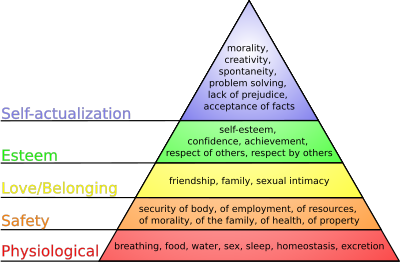Continuing the mobile phone theme, I came across a presentation by Jan Chipchase at the TED conference (via the putting people first blog at experientia.com). I’ve posted it below if you want to check it out.
I’ve mentioned Jan in the past and have subscribed to his blog, future perfect, for quite a while now. I’m always intrigued by what he is doing, much of which is only peripherally involved in the design of future mobile phones. The TED presentation is a good amalgamation of his thoughts, and has some pertinent insights.
For those who don’t know his work, Jan is a researcher for Nokia focused on how people use technology. He has travelled all around the world to see what people carry with them. Pretty much worldwide, people carry three things with them; keys, money, and (increasingly) mobile phones. These are connected directly to our most basic needs (as described by Maslow), specifically our well-being in a physiological and safety sense. Mobile phones are right there in the mix; they provide us with a way to provide four our own security and that of those we care about.

Through his observations, Jan comes to a number of conclusions, including the following. In the modern world, our experience transcends space and time. Your sense of your identity is out of date. The only way never to forget anything, is to have nothing to remember, and you can only do this by delegating what you need to remember to those around you.
This reminds of a story I once heard about Prince, aka the artist formerly known as the artist formerly known as Prince. As the story goes, Prince has all his clothes designed for him, and none of the clothes have pockets. If you don’t have pockets, where do you keep your keys, money, and mobile phone? All that has to be delegated to somebody else. So maybe it’s true that importance in the world can be measured in inverse relationship to the amount of keys you carry. Janitor, lots of keys. Presidents and Queens and Princes, no keys.
Those of use who have keys (and money and phones) all behave the same way when we leave a room; first, we check our pockets (or purses, I suppose), and then look back into the room we came from to be sure we haven’t forgotten anything. I sometimes do the opposite. I’ve got a couple pair of pants that have a clever new design adaptation; a side pocket constructed to hold a mobile phone. This is terrificly convenient, but occasionally presents me with a mental challenge, especially when I’m going through the security line at the airport. More than once I’ve set off the metal detector because I forgot I had the phone in its special sleeve.
From a design perspective, Jan points out that the uses of technology are determined by the adopters, and are very often different from what we expect them to be. Product designers provide the basic functionality, and the extensions are added by the users. For this reason, he says he doesn’t know what the future will look like. If we want to design the future, we need to learn to listen.